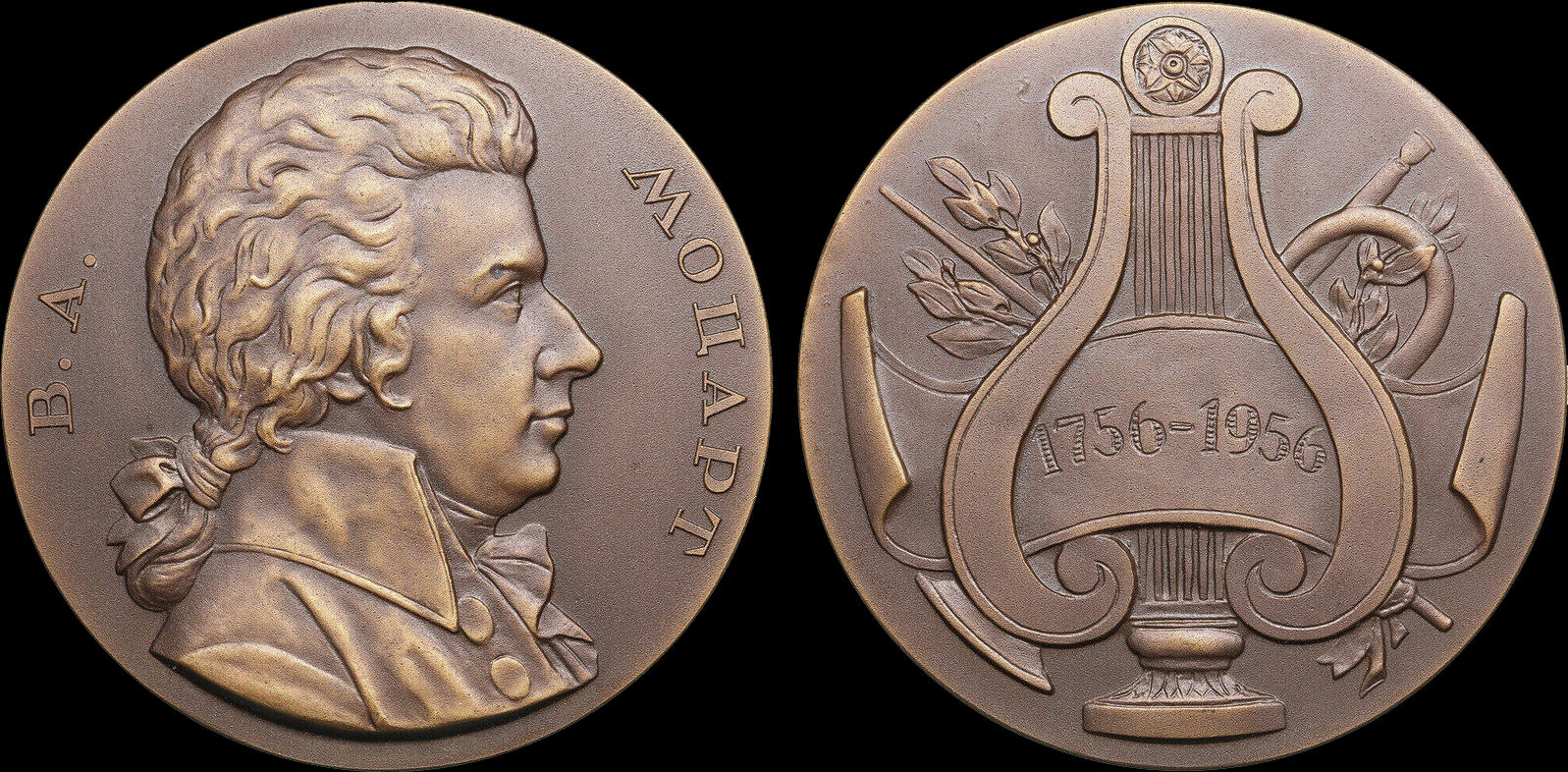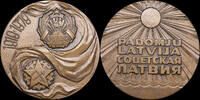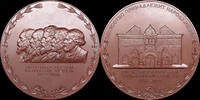MA-号码: 608502090
USSR / Russia 1958 In memory of the 200th Anniversary of the birth of W.A. Mozart UNC
Diameter 67 mm. Minted 1719 pc. Шкурко, Салыков# 147.
"200 лет со дня рождения В.А.Моцарта"
Wolfgang Amadeus Mozart: The Prodigy of Classical Music
Wolfgang Amadeus Mozart, born on January 27, 1756, in Salzburg, Austria, remains one of the most celebrated figures in the history of classical music. His prodigious talent, prolific output, and the enduring appeal of his compositions have earned him a place among the greatest composers of all time.
Early Life and Prodigy:
Childhood: Mozart showed remarkable musical talent from an early age. By the age of five, he was composing his own music, and at six, he performed before European royalty. His father, Leopold Mozart, a violinist and composer, played a crucial role in nurturing his son's talent, taking him on tours across Europe.
Education: Although he received a broad education, music was his primary focus. His travels exposed him to various musical styles and traditions, influencing his eclectic and innovative compositions.
Musical Career:
Operas: Mozart's operas are among his most celebrated works. "The Marriage of Figaro," "Don Giovanni," "Così fan tutte," and "The Magic Flute" showcase his ability to blend comedy with profound human insights, using music to explore complex emotions and social commentary.
Symphonies and Chamber Music: He composed over 600 works, including 41 symphonies, numerous concertos, string quartets, and sonatas. His Symphony No. 40 in G minor and Symphony No. 41 ("Jupiter") are particularly noted for their emotional depth and structural brilliance.
Piano Concertos: Mozart's piano concertos, especially those from his later years, are masterpieces of the genre, balancing virtuosity with lyrical beauty, often serving as a bridge between the performer and the audience.
Personal Life and Challenges:
Financial Struggles: Despite his fame, Mozart faced financial difficulties throughout his life. His lavish lifestyle, coupled with the fickleness of patronage and the competitive nature of the music world, led to periods of economic hardship.
Health and Death: Mozart's health declined in his later years, and he died on December 5, 1791, at the age of 35. The cause of his death remains a subject of speculation, with theories ranging from kidney failure to rheumatic fever.
Legacy:
Influence: Mozart's music has influenced countless composers and musicians. His ability to convey human emotions through music, his technical mastery, and his innovation in form and harmony have made him a cornerstone of Western classical music.
Cultural Impact: Beyond music, Mozart's life and work have inspired numerous books, films (notably "Amadeus" by Milos Forman), and even academic studies, exploring themes from genius to the social conditions of 18th-century Europe.
Mozart's Enduring Appeal:
Universality: His music transcends time, appealing to listeners across centuries. Whether it's the playful overture to "The Magic Flute" or the profound Requiem, Mozart's compositions touch on universal themes of love, loss, and the human condition.
Educational Value: His works are often used in music education due to their clarity of structure and emotional expressiveness, making them ideal for teaching both the technical and expressive aspects of music.
Wolfgang Amadeus Mozart's life was brief but extraordinarily productive. His music, characterized by its melodic beauty, emotional depth, and structural perfection, continues to captivate audiences worldwide, ensuring his legacy as not just a prodigy but a timeless master of music.
"200 лет со дня рождения В.А.Моцарта"
Wolfgang Amadeus Mozart: The Prodigy of Classical Music
Wolfgang Amadeus Mozart, born on January 27, 1756, in Salzburg, Austria, remains one of the most celebrated figures in the history of classical music. His prodigious talent, prolific output, and the enduring appeal of his compositions have earned him a place among the greatest composers of all time.
Early Life and Prodigy:
Childhood: Mozart showed remarkable musical talent from an early age. By the age of five, he was composing his own music, and at six, he performed before European royalty. His father, Leopold Mozart, a violinist and composer, played a crucial role in nurturing his son's talent, taking him on tours across Europe.
Education: Although he received a broad education, music was his primary focus. His travels exposed him to various musical styles and traditions, influencing his eclectic and innovative compositions.
Musical Career:
Operas: Mozart's operas are among his most celebrated works. "The Marriage of Figaro," "Don Giovanni," "Così fan tutte," and "The Magic Flute" showcase his ability to blend comedy with profound human insights, using music to explore complex emotions and social commentary.
Symphonies and Chamber Music: He composed over 600 works, including 41 symphonies, numerous concertos, string quartets, and sonatas. His Symphony No. 40 in G minor and Symphony No. 41 ("Jupiter") are particularly noted for their emotional depth and structural brilliance.
Piano Concertos: Mozart's piano concertos, especially those from his later years, are masterpieces of the genre, balancing virtuosity with lyrical beauty, often serving as a bridge between the performer and the audience.
Personal Life and Challenges:
Financial Struggles: Despite his fame, Mozart faced financial difficulties throughout his life. His lavish lifestyle, coupled with the fickleness of patronage and the competitive nature of the music world, led to periods of economic hardship.
Health and Death: Mozart's health declined in his later years, and he died on December 5, 1791, at the age of 35. The cause of his death remains a subject of speculation, with theories ranging from kidney failure to rheumatic fever.
Legacy:
Influence: Mozart's music has influenced countless composers and musicians. His ability to convey human emotions through music, his technical mastery, and his innovation in form and harmony have made him a cornerstone of Western classical music.
Cultural Impact: Beyond music, Mozart's life and work have inspired numerous books, films (notably "Amadeus" by Milos Forman), and even academic studies, exploring themes from genius to the social conditions of 18th-century Europe.
Mozart's Enduring Appeal:
Universality: His music transcends time, appealing to listeners across centuries. Whether it's the playful overture to "The Magic Flute" or the profound Requiem, Mozart's compositions touch on universal themes of love, loss, and the human condition.
Educational Value: His works are often used in music education due to their clarity of structure and emotional expressiveness, making them ideal for teaching both the technical and expressive aspects of music.
Wolfgang Amadeus Mozart's life was brief but extraordinarily productive. His music, characterized by its melodic beauty, emotional depth, and structural perfection, continues to captivate audiences worldwide, ensuring his legacy as not just a prodigy but a timeless master of music.
Info / FAQ
| Shipping fees | ||||
|---|---|---|---|---|
| 8.32 元 to 415.83 元 | 415.83 元 to 1,663.33 元 | 1,663.33 元 to 4,158.32 元 | over 4,158.32 元 | |
| China | 99.80 元 | n/a | n/a | n/a |
| Germany | 41.58 元 | 41.58 元 | 41.58 元 | 124.75 元 |
| Estonia | 41.58 元 | 41.58 元 | 41.58 元 | 99.80 元 |
| United Kingdom | 41.58 元 | 41.58 元 | 41.58 元 | 207.92 元 |
| United States | 41.58 元 | 41.58 元 | 41.58 元 | 332.67 元 |
| European Union | 41.58 元 | 41.58 元 | 41.58 元 | 207.92 元 |
| World | 99.80 元 | 124.75 元 | 831.66 元 | 831.66 元 |
Information
Online orders are welcome as always and will be shipped directly.
|
商店主页 | 0购物车 | 使用条件 | 联系 | MA 使用条件 | 隐私声明 | 保证期 | MA-Shops 新商品 Copyright ® 2001-2025, MA-SHOPS Coins All Rights Reserved. Designated trademarks and brands are the property of their respective owners. |
 Buy coins with warranty
Buy coins with warranty +49 (0)2871 2180 383
+49 (0)2871 2180 383 




















